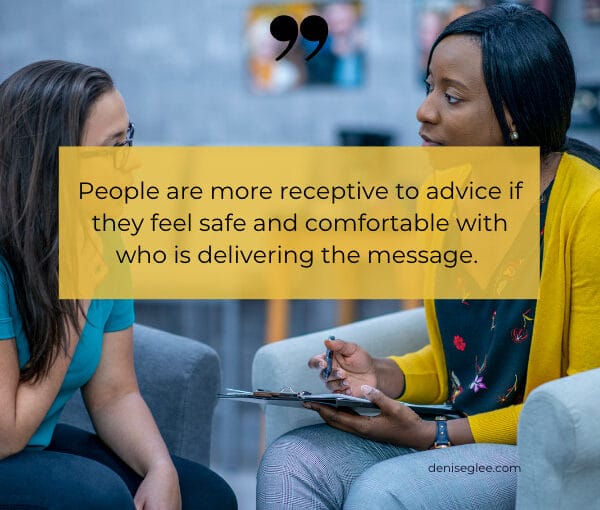
8 Steps to Providing Constructive Feedback
- Published:
- Updated: April 12, 2024
Have you ever had to give someone feedback and felt uncertain about how it would be received?
As a life and business coach, I understand the importance for leaders like yourself to communicate opinions on sensitive subjects such as tardiness, employee efficiency, or other issues with tact and care. Instead of avoiding these conversations and allowing them to potentially escalate into disasters, we can address them with others in a kind and empathetic manner.
In this article, we will discuss eight steps to provide helpful advice and constructive feedback to others.
8 Steps to Providing Constructive Feedback
1. Start with a good reason where BOTH of you will benefit from the conversation.
People don’t want to talk with others where there is no net-gain or mutual benefit. Before you open your mouth and speak, think about how you and the other person will benefit from the conversation.
For example, beyond saying something like, “So that you can keep your job,” you can say, “I want you to advance into a better-paying position than where you are right now.” Think win-win.
Speak from a place a empathy
When sharing advice or feedback make sure it comes from a place of trust, concern and care for you and the other person. Using phrases like, “when I was in your situation” and citing examples demonstrates you care about the other person.
Making sure your messaging is appropriate
As leaders, how we communicate is critical. And that means you cannot make someone feel uncomfortable so that you can feel good about yourself.
For example, it is OKAY to talk with someone who avoids asking for help because the lack of help hurts themselves and others. However, it is NOT OKAY to discuss their fears without scheduling an appointment about their fears. Here are some tips to having a difficult conversation with others.
If you have a habit of people-pleasing, listen to the episode below. Learn how to speak you needs without feeling guilt or shame.
2. Ask yourself if YOU are best to deliver the news.
Ask yourself if you are the best person to deliver the news. You could be 100% right about your feedback, but due to a variety of reasons, may not be the right person to deliver the message. People are more receptive to advice if they feel safe and comfortable with who is delivering the message.
3. No surprises please.
Nobody likes emotional surprises, especially about discussing sensitive subjects of areas of weakness. Tell them about your intentions and goals of the discussion BEFORE you meet.
For example, you may say, “Hey Nervous Nancy! I want to talk with you about how we can help improve (fill in the blank issue). I got some ideas you may like to hear. Do you have 30 minutes to talk?” Safety for the other person is key. Make sure they understand what will be discussed.
Important: Be sincere about what your intentions with others. People can sense when they you want to say something that they may find upsetting.

4. Develop, don’t destroy honest communication.
The purpose of the feedback is be honest and clear about HOW the other person can improve. This isn’t a time to make someone feel like a pile of crap.
Be confident, stay focused on how they can improve and why it will help everyone, including them. No accusations or blame here. If applicable, you can be honest with your own past struggles with the issue.
If you need help improving your communication skills, don’t hesitate to enroll in one of my courses.
5. Work it together with tons of compassion.
Ask for their input to solve the problem or seek resolution. Again, you are working to help improve – not hurt. If they need to cry or show a display of emotion, give them the space. Don’t interrupt while they speak – you may learn something new about them.
6. Instill confidence that you believe in them.
Nobody wants to improve if they feel like a loser. Remind them they are capable. Tell them how they can and will improve with consistency and practice.
7. Conclude with love.
Thank them again for their honesty and transparency. Thank them for being open to hear your thoughts. Here are some wonderful scripts to write, “Thank you.”
8. Help them succeed.
If necessary, create a follow up or create a plan to help them succeed. As you explain the plan, emphasize how they will benefit from the process. Most importantly, make the plan together.
Remember: You want people to feel confident in their actions. Most people are willing and eager to stick to a plan that they develop.
Need more help?
I want to support you. If you need more help, check out one of my available courses. Also, check out the episode from my podcast below where I discuss with a guest how to improve your communication skills with others.






Add A Comment
You must be logged in to post a comment.